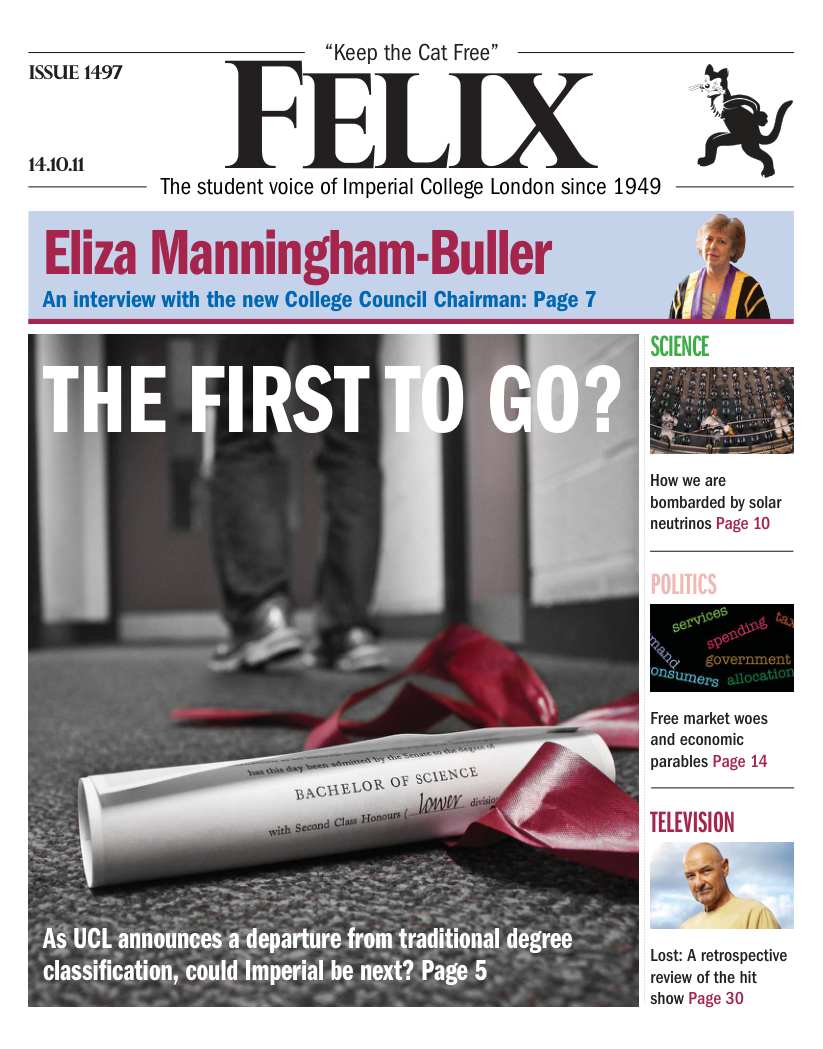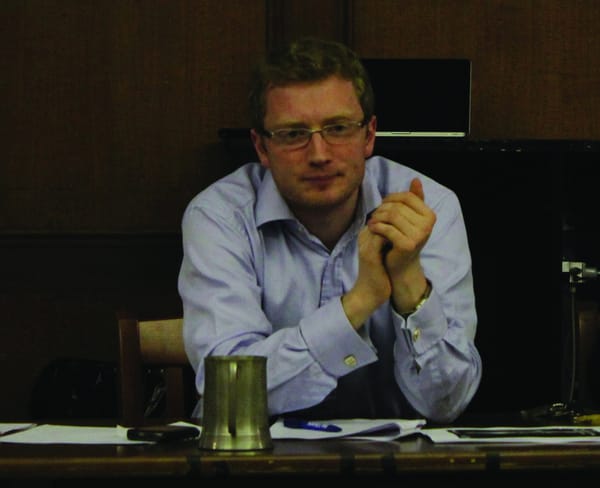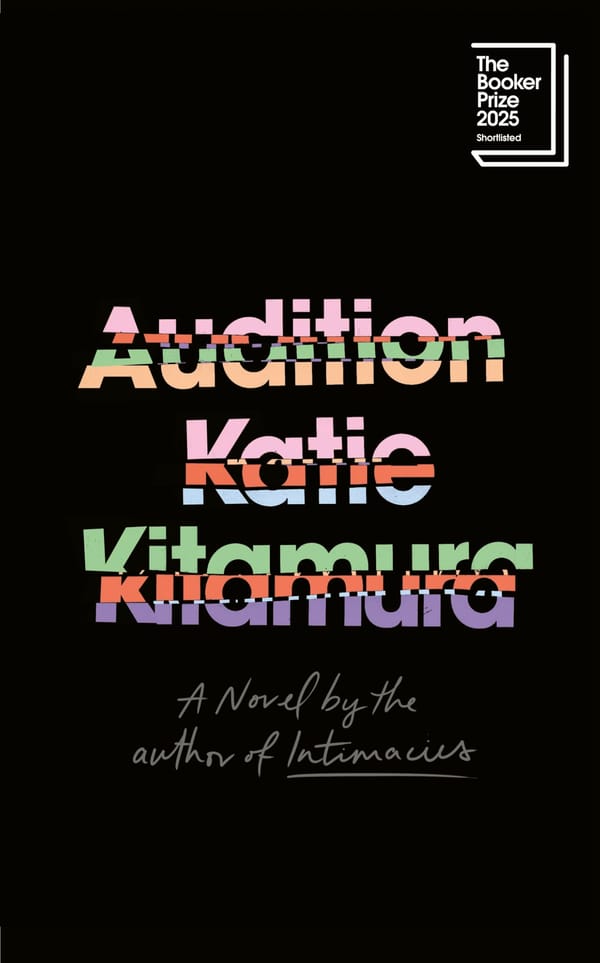UCL to introduce 'grade point average'
As the honours system is scrapped, Felix asks whether Imperial could follow suit

University College London is to scrap the widely used honours system, where students are awarded a first, 2:1, 2:2 or third at the end of their degrees, and move towards US style Grade Point Averages (GPA). UCL Provost Professor Malcolm Grant last week told The Telegraph that “award inflation over the past three decades has led to student performance being essentially recognised by classification into only two main groups: first class and upper second class honours.” He called the system “crude and undistinguished” and said that the changes would “ensure that our students’ mode of study is internationally recognised”.
In the US, GPA system students receive letter grades, each with associated numerical values. The final grade for their degree is the average of the numerical values of the grades that they received over the course of their studies. It is common that, in addition to this, a fixed percentage of highest scoring students receive honours such as summa cum laude. The exact form of UCL’s new degree classification is as of yet unknown but the UCL Council’s ‘White Paper 2011-2021’, which “outlines a vision and strategy for UCL for the coming 10 years”, states it “will be distinctive, and will be developed in such a way as to enable the GPA score for each student to be generated automatically from existing percentage-based assessment scores.”
"An employer cannot know which first is a good first"
The idea of following in UCL’s footsteps, however, is not popular with the College’s students, according to a recent survey. Imperial College Union’s ‘Response to the 2011 [Government] Higher Education White Paper’, written by Union President Scott Heath, Deputy President (Education) Jason Parmar and Representation Coordinator Andrew Keenan, notes that a student survey conducted by the Union this August indicates that the current honours system is generally supported by students. The survey, however, also indicates that the system “was of decreasing popularity as cohorts progressed, with final year, masters and PhD students being least supportive.” A third year UK student is quoted as saying that “all firsts were not created equal; an employer cannot know which first is a good first and which is not.”
Asked whether a Grade Point Average system might improve graduates’ competitiveness on the international arena, which is unfamiliar with the British system, Heath responded that he feared this effect might be outweighed by an increase in competitiveness between students on a course, resulting in a corresponding decrease in cooperation. The August survey indicated that students were opposed to any system that ranks graduates within their class for the same reason. The ‘White Paper Response’ quotes a student as saying that they think that “a ranking would be a bad idea as people would no longer work together, but against each other.”
"Very few academics believe the current system makes much sense"
Imperial academics, however, are more open to changes in the system. Speaking in a personal capacity, the Chemical Engineering Senior Tutor, Dr Andreas Kogelbauer, agreed with UCL’s Professor Grant, claiming that the current system is crude. He pointed to the massive difference between a 2:1 degree where a student achieved 61% and one where the student achieved 69%. He also highlighted that introducing a GPA system would remove the need to make difficult decisions about what degree to award students who are on the boundary between two honours - a “process that is not [entirely] objective”.
He dismissed fears about increased competitiveness by pointing out that Imperial degree programs are already very competitive and that the effect of this is offset by labs and projects that emphasise teamwork. He also rejected Jason Parmar’s concerns that unless most of the Universities in the UK adopted the new system at once those who abandoned honours would be at a disadvantage as a result of confused employers. Dr Kogelbauer said that he believed that Imperial’s “brand” was strong enough for people to appreciate its degrees regardless of the system. He believes that the College “could go it alone” as long as it published data on how many graduates got what percentages. This would be to compensate for Imperial’s courses often being more difficult than other institutions’, which often results in lower marks.
Professor Jonathan Mestel, Director of Undergraduate Studies in the Department of Mathematics, agrees with many of Dr Kogelbauer’s points. He says that “for a scientific institution in particular, the degree classification system, with its deliberate reduction of experimental accuracy, is very strange.” He expressed a personal “sympathy with any drive for the publication of either a percentage or a year-position, either along with, or instead of a degree class”, especially in Mathematics where “due to the precision of the discipline, [one is] able to rely heavily on the accuracy of ... individual marks”. He conveyed his view that while “very few academics believe the current scheme of degree classification makes much sense ... many are reluctant to tinker with a system which works tolerably well, and which employers understand.”
"By rushing things students would be disadvantaged"
All parties, however, agree that grade inflation, one of UCL’s main reasons for the change, is not a problem at Imperial. Scott Heath has said that he firmly believes that Imperial is greatly concerned with its academic reputation and as a result strives to ensure that the requirements for achieving a particular degree class are the same each year. He also pointed out that The Telegraph article about the UCL change was not entirely correct regarding its statement that 80% of Imperial College degrees awarded last year were firsts and 2:1s. Heath claims instead that the actual figure is approximately 67% when taking into account the unique classification of medics, a figure that is average for the Russell Group. Dr Kogelbauer has explained that 92% of Chemical Engineering’s graduates receiving a first or 2:1 is a result of improvements in the quality of student intake and teaching. This was supported by Heath and Parmar, who praised the quality of communication between students and staff in the department. Dr Luc Vandeperre, Materials Senior Tutor, has attributed the five year-on-year increases in the proportion of firsts and 2:1s awarded by his Department (it went up from 69% in 2010 to 72% in 2011) to hard work by students and admissions tutors who “have been attracting increasingly better prepared students”.
Dr Vandeperre is also sceptical about “how a grade point average would be better at combating grade inflation”. This is a sentiment shared by Professor Mestel who says that “the key question is does 75% this year correspond to 75% next year?”
Opinion about Grade Point Average system is clearly divided. However, as Professor Mestel reminds us, “such matters are usually decided at College level” and there are no indications that the College is likely to abandon the honours system any time soon. It is also worth remembering Dr Kogelbauer’s belief that “by rushing things students would be disadvantaged”.








